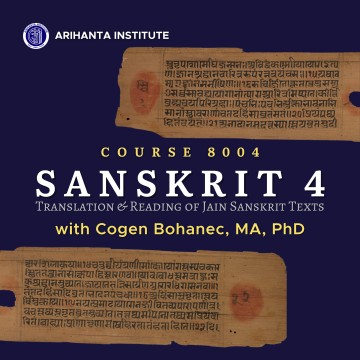Sanskrit 4: Translation & Reading of Jain Sanskrit Texts
Course Intro Video


Sanskrit 4: Translation & Reading of Jain Sanskrit Texts
 Spring 2026 (January 26 – May 4, 2026)
Spring 2026 (January 26 – May 4, 2026)Tuesday 8:00 - 9:30 a.m. PT and Friday 8:00 - 9:30 a.m. PT
Course 8004
This advanced Sanskrit course is a direct continuation of Sanskrit 3 and forms part of Arihanta Institute’s ongoing faculty–student research project on Hemacandra’s Yoga-śāstra and its Svopajña-vivaraṇa commentary. Designed for students who have completed a foundational first-year Sanskrit sequence and can read intermediate prose and verse texts, the course applies grammatical and interpretive knowledge to the translation and analysis of this seminal Jain treatise. Through the close reading of Yoga-śāstra passages and their commentarial explanations, students deepen their understanding of Sanskrit syntax, Jain philosophical vocabulary, and classical scholastic style while situating the text within broader South Asian intellectual traditions.
In addition to its focus on Jain philosophy and hermeneutics, the course provides a linguistic foundation for understanding the evolution of Indo-Aryan languages. Mastery of Sanskrit at this level equips students for further study of the Middle Indo-Aryan Prakrits, Apabhraṃśas, and later vernaculars—languages that are central to the study of Jain and wider South Asian literary traditions.
Emphasis is placed on developing publication-quality translation and research skills, integrating philological precision, hermeneutic awareness, and critical engagement with primary and secondary sources. By participating in a collaborative academic environment—where faculty and students contribute to an evolving body of Jain Studies scholarship—students refine their ability to produce rigorous, well-annotated translations suitable for conference presentation or publication. The course culminates in an independent research paper demonstrating mastery of Sanskrit language and commentarial analysis within the context of Hemacandra’s thought and Jain philosophy more broadly.
This course is not offered directly for university credit from Arihanta Institute. However, students who wish to receive language credit from their home institutions (including the MA in Engaged Jain Studies at Claremont School of Theology) are encouraged to contact their administrations to explore the possibility of having this course count toward academic credit through their home institutions. Many universities, particularly at the graduate level, provide mechanisms such as a “special reading course,” “directed reading course,” or other forms of independent study that allow students to work with a faculty member at their institution to tailor a course to their specific needs. In the past, Arihanta Institute students have successfully arranged with their home institutions to take our language classes for university credits from their home institutions under such frameworks, with our instructors providing the final grade and grading rubric directly to their institution. If you are interested in pursuing academic credit in this way, please consult with your home institution’s administration about the available options, and Dr. Bohanec will be happy to work with them to submit your grade for the course to them.
Learning Objectives
- Develop advanced Sanskrit reading, translation, and philological skills, demonstrating mastery of complex grammar, syntax, and vocabulary through accurate and idiomatic renderings of primary texts.
- Analyze and interpret Sanskrit commentarial literature with attention to Jain philosophical frameworks—particularly Hemacandra’s Yoga-śāstra and Svopajña-vivaraṇa—while engaging in comparative hermeneutic dialogue with Hindu and Buddhist traditions.
- Apply linguistic and hermeneutic methods to assess philosophical arguments, religious language, and the structure of commentarial reasoning in premodern South Asian texts.
- Situate Jain philosophical texts within broader South Asian and global intellectual traditions, including comparative study of dharmic and Abrahamic perspectives on ethics, epistemology, and contemplative practice.
- Discuss and critique nuances in South Asian philosophy, theology, linguistics, literature, and culture, demonstrating both technical precision and interpretive depth.
- Produce publication-quality translation and research projects, integrating philological analysis, hermeneutic reflection, and ethical awareness appropriate to graduate-level scholarship.
Learning Area
 Jain Philosophy, History & Anthropology
Jain Philosophy, History & Anthropology Instructor
 Cogen Bohanec, MA, PhD
Cogen Bohanec, MA, PhD
Cogen Bohanec currently holds the position of Assistant Professor in Sanskrit and Jain Studies at Arihanta Institute where he teaches various courses on Jain philosophy and its applications. In addition, he is an Adjunct Assistant Professor at Claremont School of Theology (CST) where he teaches Sanskrit and Gujarati, and he has taught numerous classes on South Asian Culture & Religions and Sanskrit language at the Graduate Theological Union (GTU) in Berkeley. Dr. Bohanec specializes in the Jain and Hindu traditions, comparative dharma traditions, philosophy of religion, theo-ethics (virtue ethics, and environmental and animal ethics in particular), and Sanskrit language and literature, and has numerous publications in those areas, particularly in the fields of Jain and Hindu Studies amongst other disciplines. He has a PhD in “Historical and Cultural Studies of Religion” with an emphasis in Hindu Studies from GTU, where his research emphasized ancient Indian languages, literature, and philosophical systems. He also holds an MA in Buddhist Studies from the Institute of Buddhist Studies at GTU where his research primarily involved translations of Pāli Buddhist scriptures in conversation with the philology of the Hindu Upaniṣads. He is the author of “Bhakti Ethics, Emotions and Love in Gauḍīya Vaiṣṇava Metaethics” (Lexington, 2024), an interdisciplinary study that frames traditional Hindu themes of ecotheology, ecofeminist theology, feminist care ethics, within a framework of virtue ethics in conversation with a bhakti-based psychology of emotions. Currently he is largely engaged in publication and research on various aspects of the Jain tradition, emphasizing translations and analyses of Jain Sanskrit, Prakrit, and Gujarati texts, but is also publishing academic works on various topics within the Hindu tradition.
Enrollment Options
14-DAY FREE TRIAL
- Free, unlimited access to our self-paced courses for 14-days.
- Already used your free trial? Enroll in our Monthly or Annual Membership options at anytime and continue learning immediately!
MONTHLY MEMBERSHIP
- $45 USD / Month
-
Immediate access to course
#### | Name. - Unlimited access to our live and self-paced courses for one month, with month-to-month auto rollover.
- Excludes graduate seminars, language courses, and courses hosted on partner platforms.

